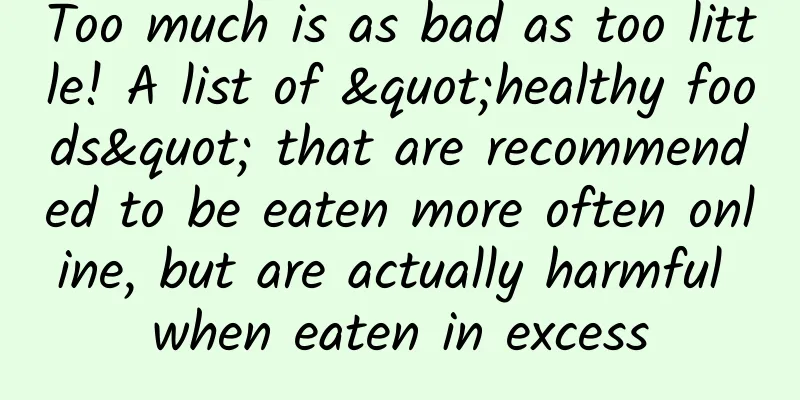Too much is as bad as too little! A list of "healthy foods" that are recommended to be eaten more often online, but are actually harmful when eaten in excess

|
We should be careful about such "health advice": some foods or medicines are very healthy, so you must eat more! In fact, most of these suggestions exaggerate the benefits and ignore the principle that too much is as bad as too little. If you really eat too much, it will often cause side effects or even cause illness. This time, Dr. Zhang will talk to you about these common "health misunderstandings": 1. Vitamin C Vitamin C is an important antioxidant in the body. It can promote growth and development, enhance immunity, and play a role in collagen synthesis and delaying cell aging. It has become an important selling point for many foods or nutritional products. Some people even recommend taking a large amount of vitamin C every day. However, excessive vitamin C is not good for health, but harmful! If taken in large quantities for a long time, it will cause platelet dysfunction, and once you stop taking it, it may cause bleeding and symptoms of scurvy. In addition, vitamin C is an acidic substance, and excessive intake will irritate the digestive tract and induce acute gastritis and gastric ulcers. The daily intake of vitamin C is 80-100 mg. Eating fresh fruits and vegetables in moderation every day can meet the minimum intake requirement. 2. Vitamin E Vitamin E is the most important antioxidant in the human body. It can promote blood circulation, regulate hormone levels, and delay vascular hardening. It is widely used in medicine, food and other fields. In particular, vitamin E has the function of protecting the skin and mucous membranes. Many businesses promote it as a skin repair agent and add it to various cosmetics. However, vitamin E is a fat-soluble vitamin that is metabolized slowly and easily accumulates in the body, causing side effects, so its safety is poor. Excessive use can cause symptoms such as night blindness, photophobia, decreased vision, diarrhea, vomiting, and even blood clots that can cause pulmonary embolism. The daily intake of vitamin E should not exceed 400 mg. If it exceeds 800 mg, it will cause poisoning symptoms. Taking 300 mg a day for more than half a year will also cause adverse reactions. Edible oils, nuts, and green leafy vegetables all contain a lot of vitamin E. If you need to supplement vitamin E for disease treatment, you must do so under the guidance of a doctor. 3. Sugar Substitute Sugar substitutes are sweeteners that produce little or no calories when consumed by the human body. The well-known xylitol is a sugar substitute, and there are also sorbitol, mannitol, etc. Low-calorie or calorie-free sugar substitutes help control weight and blood sugar, and are now commonly used in the preparation of low-sugar, low-calorie foods for patients with diabetes, obesity, etc. Foods advertised as "zero calories" use sugar substitutes. However, long-term consumption of sugar substitutes may lead to decreased insulin sensitivity and blood sugar metabolism disorders; it may also cause adverse reactions such as diarrhea, indigestion, and digestive tract flora imbalance. The International Nutrition Society once recommended that the daily intake of sugar substitutes should not exceed 3.3 units, which is equivalent to 330ml of sugar-free beverages. I am Dr. Zhang from the Department of Cardiology. If you like my popular science articles, please like them! Follow me to learn more about heart disease! You can also share this article with friends in need! |
<<: World Parkson's Day | Parkinson's patients should be aware of these swallowing problems!
>>: One food may cause 45 diseases! Doctors remind you not to eat more than this amount!
Recommend
The perfect woman should no longer be entangled in the issue of "size"
Not only men will look twice at women with big br...
China Academy of Information and Communications Technology: Domestic 5G mobile phone shipments in April 2022 were 14.585 million units, a year-on-year decrease of 32%
Recently, the China Academy of Information and Co...
How much estradiol is best for egg retrieval
Many people do not know what estradiol is. In fac...
What is the reason for lower abdominal bloating and pain?
When bloating and pain occur in the lower abdomen...
Do you occasionally have sex during menstruation?
For some couples, it is a headache to have menstr...
Women are most afraid of liver depression
Women tend to be more emotional and easily troubl...
What you need to know about stroke
What is a stroke? Stroke, commonly known as "...
National Ear Care Day丨How many behaviors are likely to cause hearing loss?
Today is March 3rd, National Ear Care Day Accordi...
Medical care for the elderly: How to prevent influenza during the peak season
Influenza, or flu for short, is an acute respirat...
Lower abdominal pain during menstruation
Women will experience some abdominal pain during ...
What special care should be taken for children, the elderly, and pregnant women after appendicitis surgery?
Author: Sun Meng, deputy chief nurse, Beijing Fri...
Do I need to stay in bed for three months after IVF?
In vitro fertilization is a surgical method that ...
EyeTrackShop: Heat map showing the ranking of social network advertising position value
Facebook is making a lot of money from advertisin...
What usually causes uterine prolapse
With the increasing incidence of gynecological di...
How long does it take to get your period after having an artificial abortion?
Artificial abortion is something that many women ...









